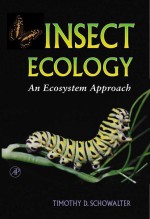Insect Ecology
Insects are a dominant group of organisms on Earth, in terms of both their species diversity and their ability to affect ecosystem structure and function, often in conflict with our management goals. Insect ecology is integral to all current environmental issues, including biodiversity conservation, ecosystem health, land use, climate change, and air and water pollution.
This text integrates traditional emphases on insect diversity, life history adaptation, and species interactions with current perspectives on insect roles in ecosystems subject to environmental changes. Insects respond to environmental changes in ways that mitigate or exacerbate change. Many species have demonstrated remarkable capacity to thrive in human-altered landscapes, whereas other species and their ecological functions are threatened by anthropogenic changes in environmental conditions. This integration of insect ecology with ecosystem ecology will contribute to understanding, prediction and resolution of the consequences of environmental changes.
Intended to provide a state-of-the-art insect ecology text and reference book that synthesizes the variety of interactions between insects and their environment, the text includes numerous references to LTER objectives and data, and many acknowledges many LTER collaborators.

 Enlarge this image
Enlarge this image